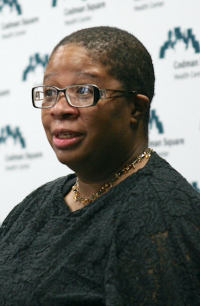February 1, 2023

Like many of us, I have felt so heavy, ridden with guilt, and grief-stricken over the tragedy in Duxbury that resulted in the alleged murder of three children by their mother, Lindsay Clancy, who reportedly was suffering from postpartum psychosis.
I am the mom of four children, including three who are with me and one who rests in paradise. When everything went well, baby blues did not creep in. However, when my second birth resulted in a child being born with a congenital heart defect that required open heart surgery at two weeks of age— and my third birth ended in a 39-week stillbirth—I was introduced to postpartum depression, Post Traumatic Stress Disorder (PTSD) and anxiety.
What I didn’t know at the time was that I was at risk of developing a Perinatal Mood or Anxiety Disorder (PMAD) because I had lived with major depression since I was nine. Since I hadn’t been told that I was at risk, my postpartum period could be compared to a Russian roulette match where at any time I could have harmed myself —which I actually did after the stillbirth— or my children.
The birthing person’s mind and body are very fragile during the postpartum period due to hormonal shifts, genetics, life, and more. The entire family needs support. It takes over 20 disciplines to support one postpartum body. So, how, exactly, do we expect women to thrive without their basic needs being met?
In April of 2021, I presented a comprehensive postpartum care model at a special Ellen Story Postpartum Depression Commission meeting. A week later, I submitted a budget proposal that would have provided state funds to develop an online app to bring support to birthing people during the third trimester and before the family is discharged from the hospital or birth center after delivery.
The budget line item passed but my organization was removed from the process. Instead, the Department of Public Health was tasked with conducting “postpartum depression programs at community health centers in the cities of Holyoke, Lynn, Worcester, Fall River and Salem and the Jamaica Plain section of the city of Boston; provided, that should a community health center decline funding, unexpended funds shall be split equally between participating programs, $300,000.” I have yet to see these programs come to fruition.
But what I have seen since then is more of the same silos instead of the realization that it will take all disciplines working together to fully support every aspect of the postpartum body.
I am re-filing the budget proposal once again to share my postpartum vision for the Commonwealth. It may or may not pass, but in the meantime, we all know someone who is pregnant or surviving their postpartum year.
Here’s how you can support them:
•Cook a little extra food and drop it off.
•Churches and auxiliary clubs can reach out to me to learn more about Mother Ruth’s Kitchen and how we can bring one to your church/club.
•Create a community for those who have none.
•Refer them to Vital Village or a Baby Cafe Meeting.
•Hire a laundry service for the family.
•Check-in and listen to the birther.
Just as it takes a village to raise a child, it is this same village that is needed to preserve the birthing person’s mind and body. Yes, any one of us could have been or could be Lindsay Clancy.
As for me, I was saved by my Nana, who loved and supported me unconditionally. She threw me a lifeline even when I said I did not need one. As my son prepares to graduate from college and my oldest daughter prepares to graduate from high school, I realize that their successes are reflective of the support I received during my pregnancies and my postpartum periods. We can all help to preserve a family and save lives.
Nneka Hall, a Mattapan resident, is a maternal health advocate who serves on the state’s Ellen Story Postpartum Depression Commission. She can be reached at nneka@motherissupreme.org.


